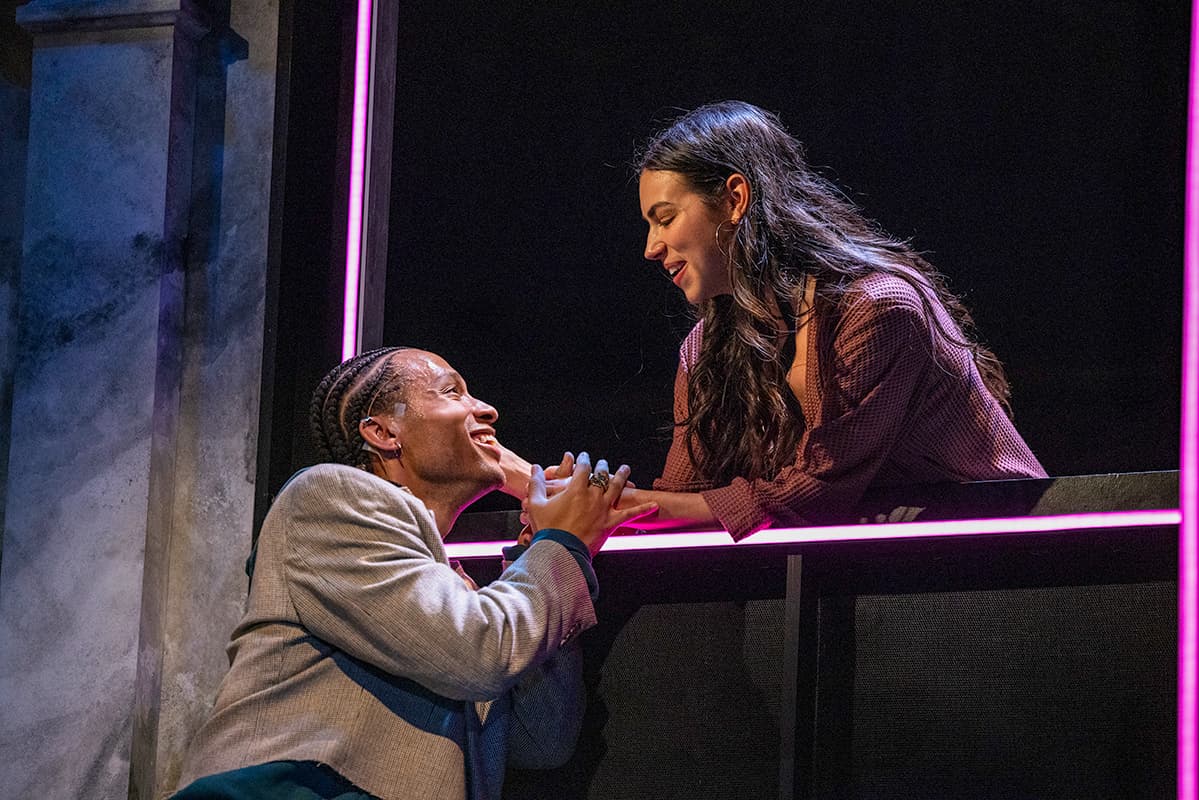Couples, Killed and Comedic
Folger provides the tragedy, while Round House lightens the mood
Surely no one needs a spoiler alert about Romeo and Juliet. After all, what is probably William Shakespeare’s most popular and most accessible play is also, to quote Folger Theatre, ”the world’s most celebrated love story.” But just in case, here goes: The namesake lovers in Romeo and Juliet die. And there’s no happy ending in sight. If you’re looking for romantic comedy, keep looking.

Romeo and Juliet
(Photo by Teresa Wood)
That is certainly the case in Folger’s new production. Director Aaron Posner puts the love at the play’s heart in stark contrast to all the hatred and violence that surrounds, and eventually subsumes, it. Posner focuses especially on the animosity of the lovers’ feuding families, the Montagues and the Capulets, which ultimately drives the play’s action, both the good and the very, very bad. In fact, the families’ generations-standing hatred and propensity to violence completely overpowers expressions of love and harmony here. In Posner’s hands, to cite his words from his director’s notes, the denizens of the play’s dark, ”starkly sobering” world don’t seem to see the light even after the many ”senseless” deaths. Other productions of Romeo and Juliet end with the sense that the warring families reconcile after all the tragedy, but that’s not so true with Posner’s, which seems as quick to end after the two lovers’ suicides as Romeo was to start the whole ill-fated affair in the first place. Though again, the blame isn’t placed on Romeo (or Juliet) but squarely on the violent, hidebound society that nurtured them.
And so Folger’s Romeo and Juliet is a dark, despairing descent into ”fair Verona,” featuring a workmanlike set by Meghan Raham that doesn’t even allow for a true, grand Juliet balcony in the Capulet household. Instead, there’s only a slight railing on the structure’s upper level and a second-floor hole through which Romeo climbs up to be with his Juliet. Laree Lentz also designs mostly drab costumes for the characters to wear, certainly for the play’s two leads. Juliet, in particular, comes across like a grungy, couldn’t-care-less Generation X-er, with blond hair but deep dark roots and a muted wardrobe whose only sense of pizzazz is what looks like a black sports bra often worn as an outer garment.



To Dec. 1
Folger Shakespeare Theatre
201 East Capitol St. SE
202-544-7077
folger.edu
Seriously, there’s not much to look at here. In fact, the production’s most visually striking elements revolve around weapons, both literally and figuratively: the medicine cabinets with elixirs and poisons all aglow in Jennifer Schriever’s lights, and the gleaming swords in Casey Dean Kaleba’s fight scenes, in which antagonists bear two swords apiece to up the ante.
There is, however, nothing drab in the acting on display — to say nothing of Shakespeare’s patently great way with words and wordplay. Both Michael Goldsmith as a hyper-charged Romeo and Erin Weaver as a determined Juliet win you over as the tragedy’s star-crossed lovers, while Signature Theatre star Sherri L. Edelen steals the show as the sweet, sassy, say-it-like-it-is Nurse. Brian Dykstra as mean dad Lord Capulet, Eric Hissom as sincere Friar Lawrence and the great comedic sensibilities of both Aaron Bliden (Benvolio) and Matthew McGee (Friar John plus two servant roles) all provide flickers of excitement.

This
(Photo by Danisha Crosby)
THEN WE HAVE AN ”UNROMANTIC COMEDY” – one term I’ve seen bandied about to describe the play This, though the current production at Round House’s Bethesda theater space is a lot better and certainly more appealing than that coinage or its non-descriptive title would suggest.
Describing in any detail the plot of Melissa James Gibson’s This runs the risk of giving too much away. At its heart is a focus on two college friends — played by Lise Bruneau and Felicia Curry — who’ve stayed besties in the decades since, but whose relationship is becoming increasingly tested by the demands and distractions of parenthood, as well as the recent loss of one of the women’s husband. (Todd Scofield plays the surviving husband.) A third college pal is the gay best friend, who naturally provides comic relief and good counsel — and at least in the hands of Michael Glenn, you’re actually charmed, not annoyed, at a stock supporting character that has otherwise become a tiring trope.




To Nov. 3
Round House Theatre
4545 East-West Highway
Bethesda
240-644-1100
www.roundhousetheatre.org
The specific incident that drives the play and serves as the basis for its generic title is a case of adultery that threatens to break the women’s bond. Naturally, the gay best friend does what he can to prevent that from happening. And then there’s the bisexual Frenchman, played with haughty charm by Will Gartshore, who offers characteristically French advice.
Gibson has a dazzling way with language and wordplay, and as directed by Round House’s Ryan Rilette her play is further peppered with light jazz music written by Eric Shimelonis and performed by Curry, who both sings and plays piano. At times both the words and music border on becoming indulgent exercises, but the show always remains entertaining. That is particularly the case as performed on James Kronzer’s signature carousel set, spinning us from one scene to the next with its many moving parts as if This is a kind of theatrical amusement-park ride. And, ultimately, at Round House it is.
Support Metro Weekly’s Journalism
These are challenging times for news organizations. And yet it’s crucial we stay active and provide vital resources and information to both our local readers and the world. So won’t you please take a moment and consider supporting Metro Weekly with a membership? For as little as $5 a month, you can help ensure Metro Weekly magazine and MetroWeekly.com remain free, viable resources as we provide the best, most diverse, culturally-resonant LGBTQ coverage in both the D.C. region and around the world. Memberships come with exclusive perks and discounts, your own personal digital delivery of each week’s magazine (and an archive), access to our Member's Lounge when it launches this fall, and exclusive members-only items like Metro Weekly Membership Mugs and Tote Bags! Check out all our membership levels here and please join us today!





















